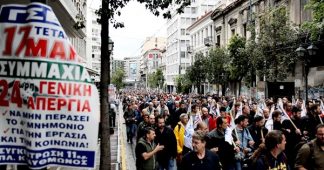Industrialists-Creditors order, SYRIZA-ANEL Vote and the People Pay the New Bill
A catastrophic multi-bill that brutally affects the interests of workers, consumers and the poor and lower middle classes was voted by the Greek government on Monday, January 15, amid strikes[i], closing the third assessment.
BY LEONIDAS VATIKIOTIS *
Despite the SYRIZA-ANEL’s attempt to downgrade its importance, the truth is that the content of the 1,531 pages of the multi-bill deteriorate the position of the popular masses in the long run.
Even if there are no new fiscal measures, as the government has rightly claimed, there are at least ten measures that deepen the despotism of capital.
However, the truth is, that there is no need for new fiscal measures! Having the Government adopt the “cutter” -an automatic fiscal mechanism-, which in an event of divergence will automatically trigger cuts in public spending, and the simultaneously target of on primary surpluses of 3.5% by 2022 and 2% by 2060[ii], it is obvious that there is no need for adopting new fiscal measures. But this does not mean that better days are coming. Harsher days are before us, despite the efforts of our Prime Minister to embellish the situation. As a matter of proof is the upcoming tax increases of 2% or 1 billion in the new year, as required by the state budget.
Let’s take a closer look at what the SYRIZA-ANEL MPs unconditionally voted on Monday, as a precondition to receive a disbursement of 3-4 bn. euros[iii], according the 3rd Memorandum of Understanding which signed Tsipras with the creditors[iv] humiliating once again the Left by identifying it with the most unpopular policies:
1 Electronic auctions.Aiming at directly restricting the political cost from the surging wave of protests every week in the peace courts and to facilitate in the long-run the banks to complete the clearance of tens of thousands of first homes, the Government transposes auctions on the Internet. By February 21st, and regardless the date of the claim execution, the auctions are “invisible”, thus starting a new round of downgrading the heavily indebted households that under the responsibility of the SYRIZA-ANEL’s government will be thrown out on the streets in masses. The rescue of the banks is once again promoted against the people.
2 Prohibition of strikes. According to Article No. 211 “a special quorum is needed at the general meetings of the trade unions, in order for the debate to take place and the decision to declare a strike to be taken. In particular, it stipulates that at least one of the registered members of the trade union must be present”. This article serves the interests of the Greek Industrialists Organization and facilitates the regime of generalized authoritarianism at the workplaces. In particular, it aims to cancel a demanding movement that will attempt to regain the losses of the Memorandum period.
3 Integration of 14 Public Services and Utilities (DEKOs) on the Privatization Mega-fund. Under Article 380, a total of 14 DEKOs will be transferred directly to the Privatization Mega-fund (Hellenic Holdings and Property Company), which employ around 40,000 employees: 34% of the Public Power Corporation (with 17% to remain on the hands of the Hellenic Republic Asset Development Fund, heading for sale), 50,3% of Athens Water Supply and Sewerage Company, 51% of Thessaloniki Water Supply & Sewerage, Hellenic Post, public transports “Athens Mass Transit System”, “Urban Rail Transport” and “Road Transport Company”, 25% of Athens International Airport, Central Market and Fishery Organizations, Thessaloniki Central Market, Thessaloniki International Fair-HELEXPO, Hellenic Duty Free Shops, Hellenic Salt Works, Etva Industrial Zones, Corinth Canal and Athens Olympic Center. This change accelerates and facilitates their privatization which is a step forward from the pan-European sell-off of the public property[v]. What is striking is that the directors of the sell-out of the Greek public property, that is, the members of the Hellenic Republic Asset Development Fund, are exempted the obligation of personal asset declarations!
4 Benefit cuts.The review of the award criteria will deprive the allowance from approximately 15,000 families, mainly families with three children, with income of more than 33,000 euros. Moreover, 54,550 families with an income of more than 13,500 euros, who have three or more children, will suffer cuts of 1,66% to 32,12%. The revision of the benefits policy, which increases the total amount of the budget for benefits, obeys a neoliberal perception that subsidizes only the extremely poor, featuring those who have underpaid jobs even as middle class, as recently Minister Eucl. Tsakalotos stated by the step of the Greek Parliament.
5 Energy stock market. The explanatory note of the multi-bill clearly states that the purpose of the creation of the Energy stock market is “the full alignment with the EU rules for the completion of the single European energy market”. Therefore, the EU is the culprit of financializing a social commodity such as energy, which will mean further privatization, which will make it even more inaccessible to citizens than it is today. As a result of the so far privatization, which has resulted in an increase in its price, it is the explosion of the phenomenon of electricity-stealing, as officially described. Based on data from the Hellenic Electricity Distribution Network Operator 3,226 cases have been identified in 2011 and 11,528 in 2016, ie an increase of 400%!
6 New Casino licenses. The changes envisaged for the casino are related to the issuance of 4 new licenses (Mykonos, Crete, Santorini, Florina), removal of the ticket, tax reduction to 20% and incentives for new construction. This change, however justifiable in the name of revenue growth, brings gambling closer to the citizen and the tourist. In order to increase public revenues, an unwritten commitment to a not-so-easy access to the casino is abandoned, so that citizens are pushed into gambling, for the benefit of not only public revenue and maybe not even of them. Instant winners is an extremely closed circle of “investors” who control black money around the roulettes and slot machines.
7 Deregulation in pharmacies – bakeries.Since 2011, pharmaceutical industry and large commercial chains have been calling -through creditors- for the release of pharmacy opening hours. And SYRIZA was the one to impose it, despite the apparent negative effects on the market caused by the partial liberalization of the opening hours that has led to the creation of two-speed pharmacies and a chaotic landscape with a some pharmacies following the new extended hours (8 a.m – 11 p.m) and other the old ones. The multi-bill, by not proving a maximum number of opening hours will lead to the closure of the small pharmacies and the dominance of the big ones. Moreover, by reducing the required square meters for bakeries it will lead to the prevalence of the big chains at the expense of the quality of food.
8 New waveof mergers in Apart from increasing the hours that teachers are obliged to be present in schools (Article 245), as stated in the introductory report “specific criteria, procedures and timetables are set for the mergers of primary and secondary schools, with the aim of rationalizing school units”. With Article 246 of the new multi-bill, SYRIZA follows the path that Anna Diamantopoulou set as Education Minister of PASOK when, for the sake of cost savings, she merged school units by applying a “school” Kallikratis Plan (major reform of the country’s administrative divisions, promoting merger of units in the sake of economy).
9 Recalculation of the heavy and unhealthy professions. At the end of the multi-bill, in Article 396, it is established a ‘committee responsible for the preparation and presentation of a proposal for the reform of the scheme of the allowance for the heavy and unhealthy professions. The accompanying reports on the implications of the Bill give more information as they clarify that “the proposed provision seeks to redesign, on a zero basis, the criteria for granting the allowance of the heavy and unhealthy professions… The proposed provision will identify from the outset the categories of beneficiaries of the heavy and unhealthy work in the public sector.”… Clearly, on the basis of reducing wage expense (by shrinking the beneficiaries) and saving additional resources.
10 Finally, electronic auctions for public debts. With a specific amendment, electronic auctions for public debts starting as early as May 1, 2018 start at € 500! This amendment (which is provided for by the Code of Public Revenues but is now in line with that applicable to banks) will have a maximum of two weeks to settle its debts to the State. With a specific amendment,! This amendment (which was provided for by the Code of Public Revenues but is now in line with that applicable to banks) the citizen will have a maximum of two weeks to settle its debts to the State. Otherwise, his property will be auctioned. The situation becomes even more dramatic from the fact that under Article 78 of Law 4472/2017 the real estate auctions for pubic debts will be carried out at market prices rather than objective values.
MPs ready for everything at the service of the oligarchy…
* Dr. PhD ECONOMIST, ANALYST
Translation: FF
[i] Greek Unions strike over curbs planned in austerity bill, http://www.dw.com/en/greek-unions-strike-over-curbs-planned-in-austerity-bill/a-42148004
[ii] Eurogroup statement on Greece, 375/17, 15/06/2017, http://www.consilium.europa.eu/en/press/press-releases/2017/06/15/eurogroup-statement-greece/
[iii] Kerin Hope, Greek parliament approves reform package in face of protests, January 12, 2018, Financial Times.
[iv] Memorandum of Understanding between the European Commission acting on behalf of the European Stability Mechanism and the Hellenic Republic and the Bank of Greece. https://ec.europa.eu/info/sites/info/files/01_mou_20150811_en1.pdf
[v] Zacune Joseph (2013) Privatising Europe, using the crisis to entrench Neoliberalism, Transnational Institute, Amsterdam.











